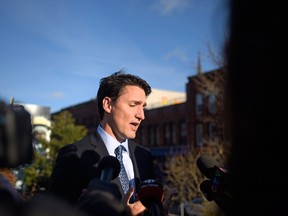Joe Oliver: Ranting about climate isn’t good government policy, and isn’t convincing anyone
We need to tone down the rhetoric and have an honest discussion based on verifiable science and the financial implications of green policies

Article content
For the past two years, the federal Liberal government has incessantly proclaimed to Canada and the world its passionate commitment to fighting climate change. The reception has been mixed. Recently, Prime Minister Justin Trudeau insisted climate be included in NAFTA and TPP agreements, even though there is virtually no chance of a substantive commitment.
Stridency and fervour in Canada and elsewhere have not moved the dial on public ambivalence about the need for action. We need to tone down the rhetoric and have an honest discussion based on verifiable science and the financial implications of green policies. Remarkably, that conversation has not occurred, even though, if alarmists are to be believed, we are facing an existential threat to humanity, or needlessly ravaging the global economy, if skeptics are right. Instead, the favoured communication approach relies on exaggeration, scaremongering, insults and intolerance of dissent.
Trudeau praised the Governor General for expressing incredulity that people still deny a human role in global warming. In fact, the skeptical position is that science has not established the extent of the anthropogenic contribution. Environmental icon David Suzuki went further. He would incarcerate politicians and corporate executives who are wilfully blind to his climate change nostrums. California Governor Jerry Brown told the Pontifical Academy of Sciences that the world needs a climate “brain washing.” A recent NBC News opinion piece argued there is a moral imperative to have fewer children because they contribute to carbon emissions, comparing childbirth to releasing a violent criminal from prison. Pace Barry Goldwater, extremism in the defence of the climate is considered no vice, and moderation in the pursuit of emission reduction is no virtue.
The skeptical position is that science has not established the extent of the anthropogenic contribution
In the face of apocalyptic messages from government, media and the self-declared cognoscenti, a September Ontario Science Centre poll found that 47 per cent of Canadians think the science of global warming is unclear, up from 40 per cent last year. In America, while people feel climate change is a problem, most believe they will not be personally affected and, in any event, they are not prepared to pay to mitigate it. Nor would 61 per cent of Germans voluntarily fork over one euro cent to fund renewables. In the U.K., the Ipsos MORI poll shows a steadily declining concern about climate change since 2005, from 82 to 60 per cent. Meanwhile, global emissions are projected to increase two per cent this year. While governments may be talking the talk, they are not walking the walk. That may partially explain a contradiction at the heart of the warmist community,
No one can be more certain of the scientific veracity or compelling morality of their jeremiad of impending global disaster. Despite that religious-like conviction, or perhaps because of it, believers react with insecurity, hostility and derision to any suggestion that deviates ever so slightly from the orthodoxy of climate catastrophe. That is the antithesis of scientific inquiry and rational debate. Ironically, it makes less likely a consensus needed to get things accomplished.
The catastrophists’ justification is that since the problem is so urgent, they cannot afford to waste precious time debating what is “settled” science. However, inconvenient facts have seriously damaged their credibility and should have shattered their certainty. Although you will not see this much in the media, climate model projections have turned out to be exaggerated if not spectacularly wrong, the polar bear population is thriving, there was a warming hiatus, and extreme events are not more frequent.
Believers react with derision to any suggestion that deviates from the orthodoxy
It’s also mostly unmentionable but true that greenhouse gas emission increases are very positive for agriculture and plant life. The bottom line is we simply do not know everything about climatology. Therefore, we should be modest about projections and highly cautious about inflicting multi-trillion-dollar costs on the global economy, which would harm billions of people, especially the poorest.
And even if the extravagant climate claims were true, we should still evaluate the specific policies designed to deal with the crisis. After all, with the stakes so high, there is a compelling need to get it right. But decision-makers are often determined to push ahead with costly initiatives, even if their impact on global temperature is predictably minuscule (see: the carbon tax and cap and trade). According to the International Energy Agency, Canada may forego up to $600 billion in capital investments by 2040, a terrible loss to employment and growth. Pain without gain is indefensible, even for a great cause.
The global-warming faith community needs to stop shouting from its echo chamber and absorb some uncomfortable facts. Maybe then more people will listen and buy into the need for sacrifice. Or, against all odds, the believers might adopt an approach that better reflects the needs of Canadians and the economic and scientific knowns and unknowns. Unfortunately, we are probably condemned to a dialogue of the deaf, until we definitively confront environmental tragedy. Or don’t.
Joe Oliver is the former minister of finance and minister of natural resources.






Postmedia is committed to maintaining a lively but civil forum for discussion. Please keep comments relevant and respectful. Comments may take up to an hour to appear on the site. You will receive an email if there is a reply to your comment, an update to a thread you follow or if a user you follow comments. Visit our Community Guidelines for more information.